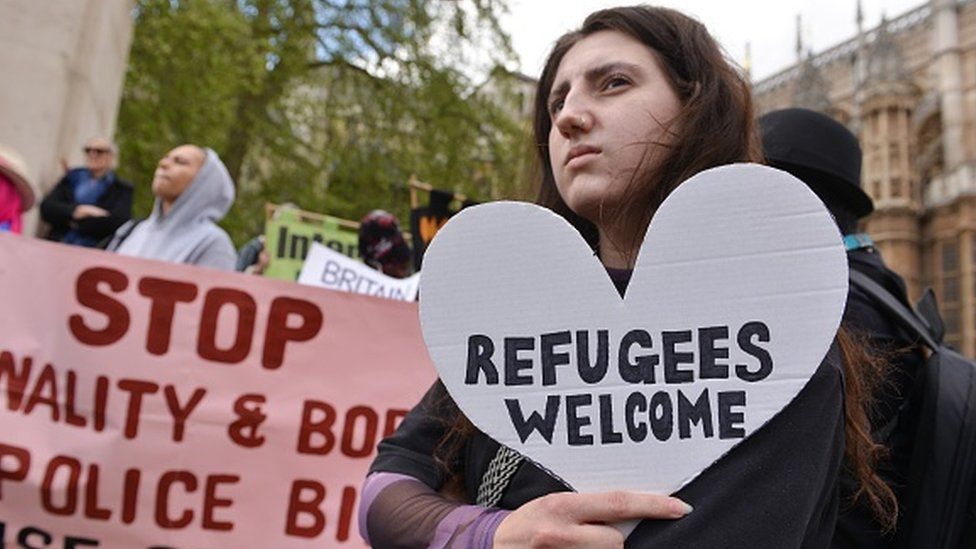
A government plan to allow asylum cases to be processed overseas will become law, after MPs and peers passed it just in time to beat the cut-off point.
Parliament was suspended on Thursday, and legislation had to be approved by then or be thrown out.
The Nationality and Borders Bill passed on Wednesday night, ending months of rows between the Lords and the Commons over its likely impact on refugees.
Controversial changes to elections and the justice system also passed.
Parliament has been prorogued, or suspended, so the government can lay out its plans for the next year or so when it returns for the Queen's Speech on 10 May.
Bills - which must be approved in every detail by both the Commons and Lords - had to be passed or discarded by the time Thursday's proceedings ended, except for a select few which were "carried over" to the next parliamentary session.
Contentious provisions in the Nationality and Borders Bill included offshoring asylum - handling claims at overseas facilities - and making it a criminal offence to knowingly arrive in the UK illegally.
The Lords has repeatedly amended the legislation and sent it back to the Commons, where MPs - the majority of whom are Conservatives - have overturned the changes.
This back-and-forth, known as parliamentary "ping-pong", ended on Wednesday when, following an occasionally bad-tempered debate, the Lords backed the bill.
Home Secretary Priti Patel called it "a huge milestone in our commitment to our promise to the British public" of an improved immigration system.
She added: "While there is no single solution to the global migration crisis, these new laws are the first step in overhauling our decades-old, broken asylum system.
"We will now work tirelessly to deliver these reforms to ensure we have an immigration system that protects those in genuine need while cracking down on abuse of the system and evil people-smuggling gangs."
But there were cries of "shame" from some peers when the legislation passed.
Liberal Democrat Lord Paddick said he was "appalled" and "disgusted" by the bill, while Labour former shadow attorney general Baroness Chakrabarti accused the Commons of giving "two fingers" to the Lords.
More than 200 organisations, including Oxfam and Save the Children, said they would challenge its outcomes, calling it "anti-refugee".
In a statement, they said the new law "rips up internationally recognised rights for people fleeing war and persecution, and will criminalise thousands of refugees".
The government has been criticised over a separate scheme to send some asylum seekers to Rwanda.
But it has said a "firm but fair" asylum system is needed to tackle people-smuggling gangs and reduce deaths among people making dangerous cross-Channel journeys in small boats.
Justice and elections bills
Peers also backed down from their row with the Commons over the Elections Bill.
This includes the introduction of photo ID for voters, which it is feared could see a significant number of people turned away from polling stations.
Other measures include parliamentary oversight of the Electoral Commission, which monitors and runs the voting system, and scrapping the 15-year limit on British citizens living overseas being able to vote from abroad.
Labour's Baroness Hayman said the government had "simply got it wrong on requiring voter ID" and was "undermining of the independence of the Electoral Commission".
Liberal Democrat Lord Wallace of Saltaire said: "One of the many adverse affects of this bill is that it makes it much easier, and without barriers, for overseas citizens to vote, but makes it more difficult for domestic citizens to vote. That's very odd, and not entirely democratic."
But Cabinet Office minister Lord True said the government did not have a "static position" on which forms of ID could be used to access polling stations.
Other bills
The Judicial Review and Courts Bill also went through after peers dropped a last-ditch attempt to fund bereaved families' legal representation at inquests involving public bodies.
The government said the inclusion of the clause to this effect was "premature", as there was an ongoing consultation on legal aid access.
Some bills have been carried over, meaning they can continue their progress in the next parliamentary session, rather than being ditched.
These include Online Safety Bill, regulating online companies and the Product Safety and Telecommunications Bill, which would extend 5G coverage
The Higher Education Bill, which would places a duty on universities in England to ensure free speech, and the Animal Welfare Bill, which seeks to crack down on puppy smuggling, have also been carried over.
https://news.google.com/__i/rss/rd/articles/CBMiL2h0dHBzOi8vd3d3LmJiYy5jby51ay9uZXdzL3VrLXBvbGl0aWNzLTYxMjUyMDY40gEzaHR0cHM6Ly93d3cuYmJjLmNvLnVrL25ld3MvdWstcG9saXRpY3MtNjEyNTIwNjguYW1w?oc=5
2022-04-28 21:03:45Z
CBMiL2h0dHBzOi8vd3d3LmJiYy5jby51ay9uZXdzL3VrLXBvbGl0aWNzLTYxMjUyMDY40gEzaHR0cHM6Ly93d3cuYmJjLmNvLnVrL25ld3MvdWstcG9saXRpY3MtNjEyNTIwNjguYW1w
Tidak ada komentar:
Posting Komentar